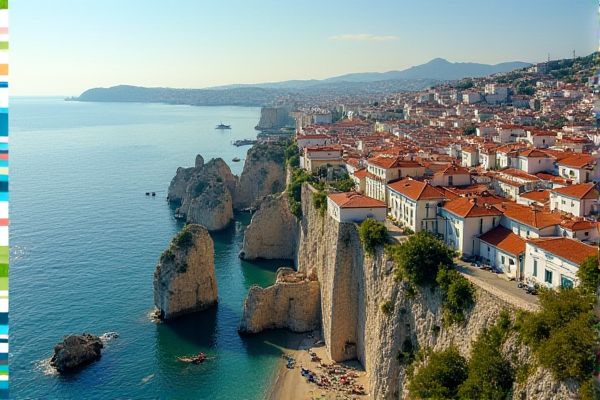
Cultural and recreational activities in Portugal: Rich festival traditions and celebrations. Fado music and cultural heritage. Historic cities with vibrant arts scenes. Famous wine-producing regions and tastings. Stunning beaches and water sports. Traditional Portuguese cuisine experiences. Numerous UNESCO World Heritage sites. Diverse landscape hiking opportunities. World-class golf courses. Growing contemporary art scene.
Rich festival traditions and celebrations.
Portugal is renowned for its rich festival traditions, featuring a diverse array of celebrations such as the Santos Populares, Festa de Sao Joao, and Festas do Espirito Santo, which showcase the country's deep religious faith, vibrant cultural heritage, and lively community spirit through various religious processions, street parties, and traditional food and music events. These festivals, including the Pauliteiros de Miranda and Festa dos Tabuleiros, highlight unique regional customs and provide unforgettable experiences for locals and visitors alike. To explore more about these vibrant celebrations, check out the details on Portuguese With Carla.
Fado music and cultural heritage.
Fado music stands as a cornerstone of Portuguese cultural heritage, emerging from the poor and working-class communities. It features two main styles originating from Lisbon and Coimbra, characterized by poignant themes of fate, loss, and nostalgia. This deeply emotional musical tradition has been recognized as an Intangible Cultural Heritage by UNESCO since 2011, underscoring its significance and enduring impact on cultural expression in Portugal.
Historic cities with vibrant arts scenes.
Lisbon and other historic cities in Portugal boast vibrant arts scenes, with landmarks like the Museum of Art, Architecture, and Technology (MAAT), the National Tile Museum, and the Belem district, which includes UNESCO World Heritage sites such as the Belem Tower and the Monastery of St. Jerome. These cities also feature rich street art, particularly in the Bairro Alto neighborhood of Lisbon, and significant cultural institutions like the Calouste Gulbenkian Museum.
Famous wine-producing regions and tastings.
Portugal's renowned wine-producing regions include the Douro Valley, Alentejo, and Algarve, offering various wine tastings and tours. The Douro Valley, a UNESCO World Heritage Site, is particularly famous for its Port wine, while Alentejo and Algarve provide diverse Wine Tourism experiences and cultural immersion.
Stunning beaches and water sports.
Portugal's extensive coastline, spanning over 850km, offers a diverse range of stunning beaches and water sports, including surfing, bodyboarding, windsurfing, kitesurfing, and stand-up paddleboarding, with popular spots in Nazare, Ericeira, Peniche, and the Algarve. For more information on surfing and other activities, visit the Visit Portugal website. Additionally, the region is perfect for motorized activities like jet skiing and water skiing.
Traditional Portuguese cuisine experiences.
Experience a hands-on Traditional Portuguese Cooking Class in Lisbon, where you learn to prepare a four-course meal of typical Portuguese dishes, enjoy the meal you've prepared, and receive a digital recipe booklet, all while savoring Portuguese wines and other beverages in a cozy and fun environment. Immerse yourself in a farm-to-table Portuguese Food Experience near Peneda-Geres National Park, where you can learn about regenerative farming, enjoy a meal prepared from organic ingredients, and hear stories about the origin of each dish, all while enjoying local wines and traditional desserts. Discover the tastes of Portugal through various food tours and experiences, including snail and strawberry tours, and learn about traditional dishes such as alheira, bacalhau, and cataplana, highlighting the rich culinary diversity of the country.
Numerous UNESCO World Heritage sites.
Portugal boasts 17 UNESCO World Heritage sites, including cultural landmarks like the Monastery of the Hieronymites and Tower of Belem in Lisbon, the Monastery of Batalha, and the Cultural Landscape of Sintra, as well as natural sites such as the Laurisilva of Madeira. These sites offer a rich variety of historical, architectural, and natural experiences for visitors. For more detailed information, you can explore the World Heritage Sites in Portugal, providing an in-depth overview of each location's unique significance.
Diverse landscape hiking opportunities.
Portugal offers diverse hiking opportunities across various landscapes, including the rugged coastline of the Algarve, the limestone and karst mountains, the volcanic terrain of the Azores, and the lush forests of Madeira. Trails such as the Fisherman's Trail, Via Algarviana, and Pico do Arieiro to Pico Ruivo showcase the country's natural beauty. Discover more about these stunning trails and experiences on the Much Better Adventures Magazine, where each path promises a new adventure.
World-class golf courses.
Portugal is renowned for its world-class golf courses, with over 70 high-quality courses, many designed by renowned architects like Jack Nicklaus and Sir Henry Cotton. The Algarve and Lisbon regions are particularly notable, offering championship-quality courses, stunning views, and year-round warm weather, making Portugal a Premier Golfing Destination in Europe.
Growing contemporary art scene.
Portugal's contemporary art scene, particularly in Porto, is thriving with galleries like Fernando Santos, Nuno Centeno, and the Serralves Museum, which host international exhibitions and promote modern art through various programs and collaborations. The city's Avant-Garde Art scene has made it one of Europe's youngest capitals of art, attracting both local and international artists.
